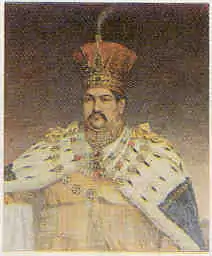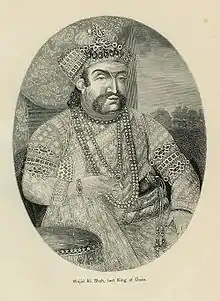Amjad Ali Shah
Amjad Ali Shah (c. 1801 – 13 February 1847) was the fourth King of Oudh from 7 May 1842 to 13 February 1847.[3]
| Amjad Ali Shah | |||||
|---|---|---|---|---|---|
 | |||||
| King of Oudh | |||||
| Reign | 7 May 1842 – 13 February 1847 | ||||
| Coronation | 17 May 1842, Farhat Bakhsh Palace, Lucknow | ||||
| Predecessor | Muhammad Ali Shah | ||||
| Successor | Wajid Ali Shah | ||||
| Born | before 30 January 1801 Lucknow | ||||
| Died | 13 February 1847 Farhat Bakhsh Palace, Lucknow | ||||
| Burial | Imambara Sibtainabad, Hazratganj, Lucknow | ||||
| Wives | |||||
| Issue | Mustafa Ali Wajid Ali Shah Mirza Jawad Khan | ||||
| |||||
| House | Nishapuri | ||||
| Dynasty | Oudh | ||||
| Father | Muhammad Ali Shah | ||||
| Religion | Shia Islam | ||||
Administration
His reign began in May 1842.[4] His administration was responsible for a new bridge over the river Gomti and a metalled road from Lucknow to Kanpur.[4] He also built the Hazratganj and Aminabad Bazar, major shopping markets in Lucknow.[5]
Death
He died of cancer[6] on 13 February 1847 at the age of 47 years. He is buried at Imambara Sibtainabad in the western part of Hazratganj, Lucknow.[1] He was succeeded by his son Wajid Ali Shah.
Sons of Amjad Ali Shah
References
- Lucknow Sightseeing Tours, Lucknow Travel Directory, Lucknow Tourism Guide, Arts & Culture of Lucknow, Places of Interest in Lucknow Archived 21 November 2008 at the Wayback Machine
- Childrens Wajid Ali Shah(Son), Ashraf un nisa Begum Malikai Douran Nawab Afsar Bahu Sahiba(Daughter) "ApnaLucknow- Your guide to the City of Nawabs: Tourist Section". Archived from the original on 27 October 2009.
- Nawab Amjad Ali Shah tornosindia.com. Retrieved 23 September 2021
- "HISTORY OF AWADH (Oudh) a princely State of India by Hameed Akhtar Siddiqui". Archived from the original on 1 September 2001. Retrieved 23 October 2009.
- NAWABS OF OUDH & THEIR SECULARISM – Dr. B. S. Saxena
- Tornos India – About Us – Nawabs of Avadh Archived 10 October 2008 at the Wayback Machine
- Published in The Illustrated London News, 1857.
- Attributed to Felice Beato, 1858–1859.
External links
- National Informatics Centre, Lucknow – Rulers of Awadh
- Historic Lucknow By Sidney Hay, Enver Ahmed
This article is issued from Wikipedia. The text is licensed under Creative Commons - Attribution - Sharealike. Additional terms may apply for the media files.


